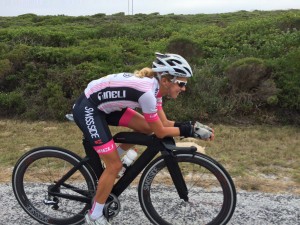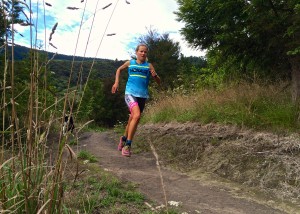 QK: Thanks for taking the time out of your day to answer these.
QK: Thanks for taking the time out of your day to answer these.I’ve heard 2014 described as a break through year for you with three Iron-distance wins, in Ironman Wisconsin, Busselton as well as Challenge Taiwan. However your first win at Ironman was two years prior and I would say that was a huge year as well. Which do you see as your biggest year?
BM: 2014 probably was my most consistent and most successful year. Especially my last win in Western Australia was my first time under 9hours and breaking the course record along the way was a nice bonus. I have come very close to 9 before, but IMWA was a big competitive field and I was over the moon coming out on top. My first IM win in 2012 has meant a lot to me though, which I will never forget.
QK: With the change to the Kona Pro Ranks (KPR) it has changed how professionals qualify for Kona. I’ve seen a lot of comments about how the women are unfairly disadvantaged by having to get more points to guarantee their slot. With being based in NZ I’m sure this isn’t an easy exercise to do either. You successfully qualified for last year. How did the introduction of KPR impact you?
BM: I could probably write a few pages about this topic 🙂 I don’t have the perfect solution for it, but the system as it is, is not fair and very hard on your body and health. To qualify as a woman and especially when you haven’t competed in Kona the previous year (the points from Kona count for the following year), you have to do a lot of races in one year plus try to be fresh and recovered in Kona. To get the most out of myself and get the best possible result, I can probably race two Ironmans a year and a few Half Distance races. Last year, I had to do 4 full Ironman races and a couple of Half Distance events. Travelling and the mental stress on top of it, makes it pretty tough and challenging to get to the start line in Kona fresh, recovered and ready to have the best race of your life. I would have loved to have had the chance to race the girls in Kona on a plain level playing field.
 QK: Sitting at home keeping tabs on what was happening in Kona last year (like every year for me) is a thrilling day. I was excited for you finishing first Kiwi Pro (ahead of the men even). It was a tough day out there for everyone, but from the online reports and brief snippets of information coming through you seemed to be doing pretty well. Your social media posts after the race show you didn’t perform to your own high standards despite the tough conditions. You had higher expectations of yourself. How tough was it out there on the Queen K and Ali Drive? How do you feel about your performance now that you have had a chance to analyse it?
QK: Sitting at home keeping tabs on what was happening in Kona last year (like every year for me) is a thrilling day. I was excited for you finishing first Kiwi Pro (ahead of the men even). It was a tough day out there for everyone, but from the online reports and brief snippets of information coming through you seemed to be doing pretty well. Your social media posts after the race show you didn’t perform to your own high standards despite the tough conditions. You had higher expectations of yourself. How tough was it out there on the Queen K and Ali Drive? How do you feel about your performance now that you have had a chance to analyse it?BM: I was very disappointed with my race and the result. I know that I am capable of a better performance and of course at a World Championship race you are hoping to produce your best possible performance. I think, there are a few reasons why it didn’t happen. Looking back now, I think I was well and truly overdone. I was exhausted and my body couldn’t perform anymore on race day. The months leading up to the race, I was in Noosa, Australia and probably had the best ever training conditions. I loved it and put very big training weeks in. I was so motivated and wanted to step up to a new level. It was risky, but I was willing to take it to get to a new level. I think I had achieved that and was flying. By the time I got to Hawaii though, I was flat. Combined with the absolute brutal heat of this years race, my body didn’t respond anymore. I had nothing left. I have been to Hawaii before, but this year was extremely hot. The conditions on the run along the Queen K were just brutal. It was 47 degrees. When you are already suffering because your body is not responding, it made it a very tough day for me. Although I was disappointed with the result, I was very proud for never giving up throughout the whole race. I wasn’t in the position I was hoping for and planing to be in, but I suffered through it and finished, despite almost half of the field pulling out. That was mentally very challenging.
QK: As a triathlete do you do any dedicated strength training? If so what sort of thing do you include?
BM: I think there are two theories about it. Some coaches believe in strength training and some don’t. I believe it depends on the type of athlete you are. I have always done a lot of core work and light strength training, mainly body weight stuff. But a few years back, I did a lot of work in the gym, including heavy weight training. As I have said, I believe it depends on the athlete and what type of racing you do.
QK: What is your favourite swim workout?
BM: Haha, like probably almost every Triathlete, I love my paddles, pullbuoy and band sessions. Give me a session including a set of 8-10 x 300 -400m Paddles and Pullbuoy and I am a happy swimmer 🙂
QK: What is your favourite bike workout?
BM: I love my long rides, especially in the mountains. A perfect day on the bike for me is a 6 hour ride, including a lot of long uphills, especially in the European Alps.
QK: What is your favourite run workout?
BM: I have got a bit of a love hate relationship with the running track. The thought of a hard interval session on the track scares me and it takes a lot of motivation. But once I have started, I absolutely love the feeling of running fast and the satisfaction of finishing the session successfully. For example: 30 min warm up, including some drills and strides, 10x1km with a 20min warm down is a typical session.
QK: What is your greatest athletic moment of your career thus far?
BM: I have had a few special moments for different reasons throughout my career. Winning IMWA in 2014 and becoming the fastest NZ woman over that distance was probably the greatest athletic moment so far.
QK: What have you learned over the last 12 months that more people should know?
BM: Being an athlete is a working process. I still learn new things about my body, training, nutrition and the mental side of it every single day. I believe, I am so much more knowledgeable and experienced then what I have been 10 years ago at the start of my athletic career and I don’t make quite as many stupid mistakes anymore, however I still don’t know it all that’s for sure. I think one of the most important things though, is to listen to your body. Following a training plan is good, but don’t be afraid of changing things around, when your body demands it.
QK: What are the two biggest training mistakes you have made and how have you come back from them?
BM: The biggest mistake I do is probably train too much and too hard. I tend to always do 10% more and 10% harder then what I am suppose to do. When you are already on your limit and train more then 30 hours a week, it’s not always a very smart thing to do. I have ended up with either stress fractures or over-training and fatigue several times. It takes a long time to recover from this. You need to have a lot of time off, which is very hard for an athlete. Unfortunately, the Kona qualifying process makes it very hard to find a healthy balance. I race best after a longer recovery time and a good long build up, but the Kona quali doesn’t allow that process.
QK: Can you give us an example of the recovery techniques you use to recover from your training weeks?
BM: Recovery is everything. It’s amazing what a difference it makes, when you take the time to do the recovery right. The most important thing is food. I always make sure, I eat straight after my training sessions, within the first 30 minutes. You need to replace protein and carbs, depending on the type of session you did. Putting your feet up and sleeping is very important as well. A regular massage is great, but can get quite expensive. I have tried to find alternatives, like hot baths or ice baths, rollers, stretching etc. You need to find out what works best for you.
QK: What events are you targeting for the remainder of the 2016?
BM: I have had a lot of health issues after Kona last year. My goal was to do Challenge Wanaka, but I had to cancel it. It has taken my body a long time to recover and get over my extensive fatigue symptoms. I am finally starting to feel better and I am able to get back into my training. I will see how quickly my body bounces back and will make a decision in the next few weeks. Fingers crossed, I will be back on the start line soon.
QK: Thanks for your time Britta and all the best with your training and ongoing recovery.
Britta is proud to be sponsored by: